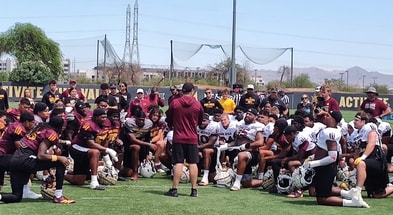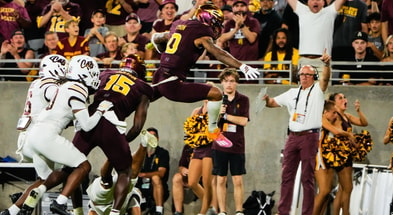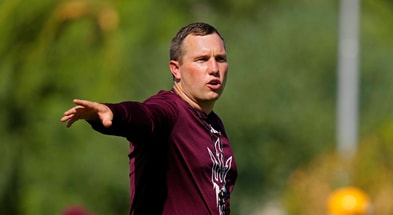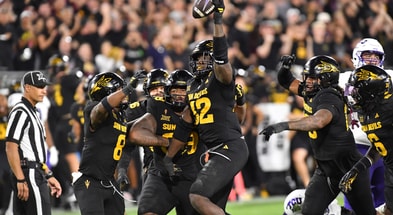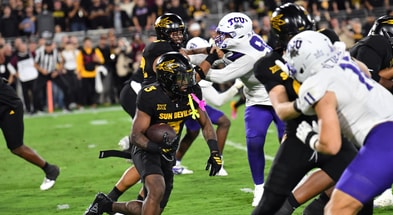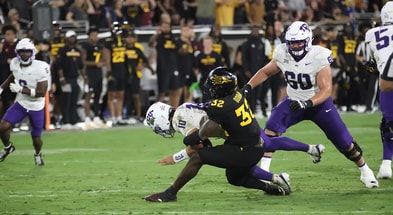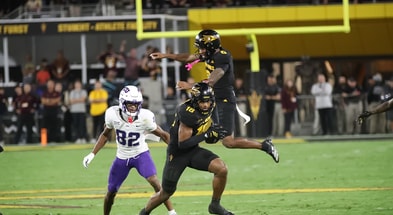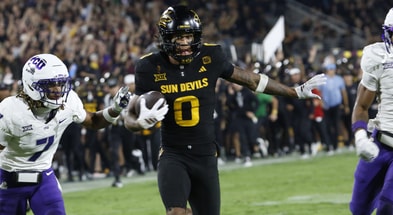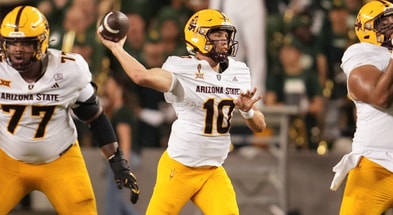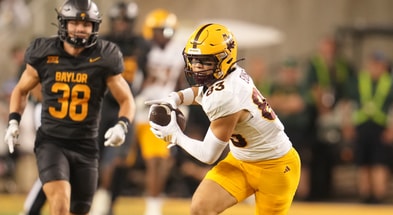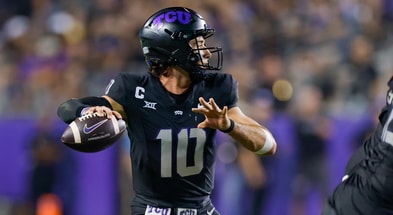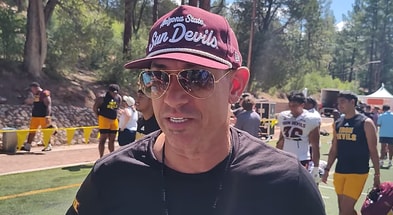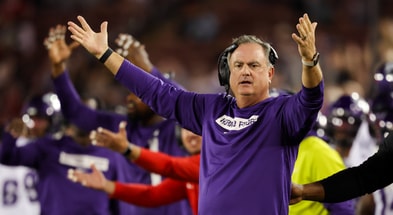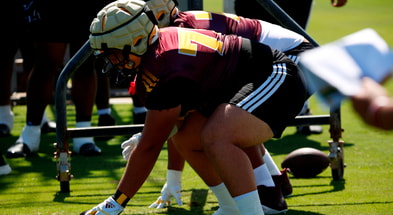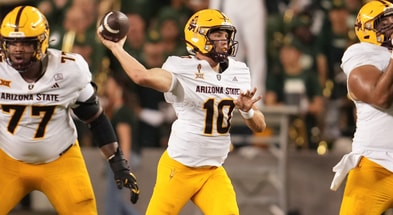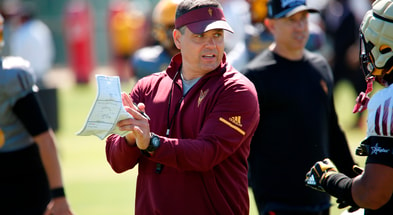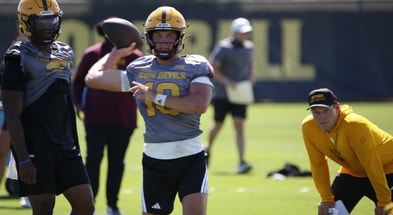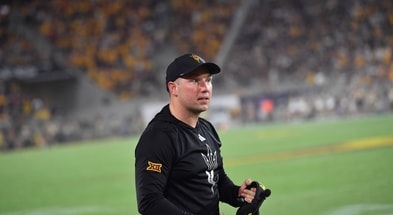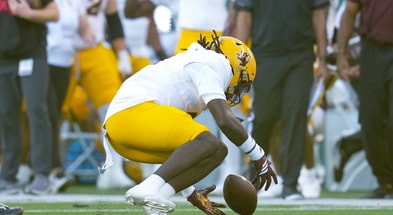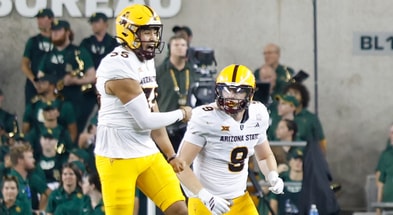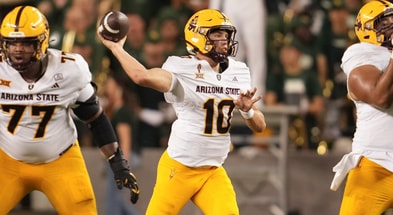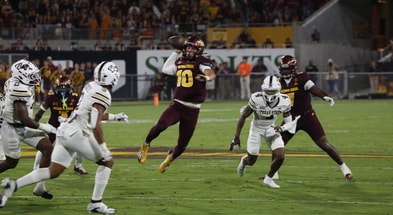Spotlight shines on youth development during bye week

Head coach Kenny Dillingham couldn’t have asked for a better response from his team. Coming off a 17-point deficit to stun No. 24 TCU, Arizona State not only collected its first ranked win of the season but also carried a level of resilience that defined the performance. Now, with a bye week before heading to Salt Lake City to face Utah, Dillingham views this moment as an opportunity to lay the groundwork for the future.
“This week is all about development,” Dillingham emphasized. “In today’s day and age, development is absolutely critical. You’ve seen some of our young guys step up already, but we’ve got to keep building depth and getting better every day.”
The bye week provides Dillingham’s staff with the opportunity to strike a balance between reflection and preparation. Red zone execution and avoiding mistakes on obvious passing downs remain key issues, with ASU leaving a significant number of points on the board against both TCU and Baylor.
“We’ve got to clean up some of our second-and-long and third-and-long situations,” Dillingham explained. “We can’t give up catastrophes in those spots. And offensively, when we’re in the red zone, we have to score touchdowns. That’s going to be a big point of emphasis.”
Part of what’s carried ASU to this point has been a defense that dominated late against TCU. The Sun Devils’ front absorbed double-teams, freed up pass rushers, anchored a second-half surge, and kept the Horned Frogs from pulling away. Dillingham praised their discipline.
“Our interior guys were phenomenal,” Dillingham remarked. “They set up everything for us to be disruptive. It was a really good team defense.”
Offensively, the emergence of the tight ends and the use of multiple personnel sets have added flexibility, with increased depth at the position making it easier to rotate even as some players work their way back from injury.
“You’ve got to play to your players’ strengths,” Dillingham noted. “Right now, those bigger packages are one of our strengths, and hopefully we’ll get some more guys back to expand on that.”
Still, Utah looms as one of the toughest challenges of the year. Utah has been tough to beat at home, especially in evening games, where they’ve won nearly two-thirds of their matchups since 2011. Dillingham knows his team will have to match both the talent and the environment.
“That place is chaotic,” Dillingham added. “They don’t lose many games at night. It’s going to be an unbelievable challenge for us to go in there, stay disciplined, and handle the atmosphere.”
Beyond X’s and O’s, Dillingham sees confidence and personality defining this year’s Sun Devils compared to last season.
“We still have resilience, but it looks a little different,” Dillingham observed. “Last year’s team was more vocal. This year’s team, it’s more of a calming resilience. They’re confident. They’re not trying to force it — they just have it.”
For now, the focus is simple: build on the breakthrough against TCU, take advantage of the bye week, and carry a sharper, more complete performance into Salt Lake.
“We’ve shown what we can do when we play our brand of football,” Dillingham reflected. “Now it’s about consistency — bringing that same standard every single week.”
***
After back-to-back strong defensive showings, ASU defensive coordinator Brian Ward has seen his unit step into the season with confidence, discipline, and depth. Holding opponents to minimal yardage and consistently generating pressure with just a four-man rush has become a hallmark of this defense, and Ward attributes much of that to the identity they’ve built up front.
“That’s who we are,” Ward stated. “Everything starts with those guys up front. If we can’t get pressure with four, everything else gets harder. That’s how we recruit, that’s what we emphasize. Third down, second down—it doesn’t matter. When you can generate pressure consistently, it makes everything else easier.”
Ward also highlighted the development of young players, pointing to sophomore linebacker Martell Hughes and senior defensive lineman Prince Dorbah as prime examples of players who arrived here as inexperienced and made considerable leaps each year. Dorbah, who transferred from Texas, uncertain of his position, has developed into a dependable force off the edge.
“When you see a guy who’s explosive, twitchy, and active, you figure out a way to build on that,” Ward remarked. “We knew if we developed him, he could be something special.”
Hughes, who played safety in high school, has thrived at linebacker thanks to traits that Ward says can’t be coached: toughness, length, athleticism, and the willingness to be physical.
“Those are the hardest things to develop. Martell has all of it, and when you combine that with his athleticism, his ceiling is really high,” Ward added.
“He’s playing very, very, physical right now,” Dillingham commented on Hughes. “I know everybody sees the interception, but they don’t see the physicality he’s playing with. He’s just an intelligent person. He’s just smart. He’s a sophomore, (who) catches an interception, goes down, and he doesn’t even flinch. He just understood the mission. It wasn’t to score a touchdown. It wasn’t to throw the ball to the crowd after (he) scored. It was to go down.”
Even with the impressive defensive numbers, Ward noted there’s room for growth. Miscommunications and minor coverage errors in red zone situations were areas he identified as needing improvement. But he was quick to praise the contributions of new players stepping into extended roles, like redshirt freshman defensive back Rodney Bimage and redshirt senior defensive back Kyndrich Breedlove, as well as redshirt sophomore defensive back Adrian Wilson adjusting at free safety. All will be key in the Utah road contest next week, facing signal caller Devon Dampier.
“They’ve got a really talented, athletic quarterback, a big, physical offensive line, and skilled guys at tight end and wideout,” Ward explained. “It’s going to be a challenge, but we’ll take it one day at a time.”
Ward also detailed how situational drills in practice have helped reinforce fundamentals, from tackling angles to pursuit techniques.
“Fundamentals are everything,” Ward emphasized. “If those aren’t on point, the scheme won’t work. We focus on consistent execution, trusting assignments, and relying on each other. The results come from that work.”
Even in positions without a returning starter, like nickelback, Ward is seeing growth and confidence. Rotating players has helped keep them fresh and focused, maintaining the high level of performance across the defense.
“Fatigue kills focus,” Ward added. “When players are fresh, they can execute at a higher level, and that helps the whole defense.”
***
Senior defensive linemen Prince Dorbah turned in a career-defining performance for Arizona State in the Sun Devils’ 27–24 comeback win over No. 24 TCU, showcasing exactly why the defensive line has become a cornerstone of ASU’s defense.
Dorbah’s night was highlighted by three sacks, four tackles for loss, and a forced fumble he recovered himself late in the fourth quarter, giving ASU the ball in scoring position and setting up the game-winning field goal. It was the kind of impact performance that drew national attention and underscored his development from a patient, injury-plagued player into one of the conference’s most disruptive defenders.
“I’ve had to be patient, battling injuries along the way,” Dorbah reflected. “You just maximize every opportunity, and when my number comes, I go out and execute. Coming into this season, my goal was to stay healthy, stay focused, and take it day by day. That mindset has really helped me grow.”
Dorbah credited the team’s competitive culture and coaching staff, particularly defensive line Coach Diron Reynolds and Ward, for helping the defensive line refine their edge rush and develop trust in one another.
“Every day in practice is a competition. You see guys like Clayton (Smith), Elijah (O’Neal), Justin (Wodtly)—everyone pushing each other, trying to win their reps,” Dorbah explained. “It makes all of us better, and when you bring that energy into a game, it shows.”
He also emphasized the importance of executing within the system.
“Our coaches always say, ‘don’t hunt plays. Let the plays come to you,” Dorbah noted. “Do your job, trust your teammates, and when your opportunity comes, make the play. That’s what I was able to do against TCU.”
With a 4-1 Utah on the horizon, Dorbah knows the challenges will only get tougher.
“They have a great quarterback, a strong offensive line, and it’s going to be a really loud environment,” Dorbah added. “Communication has to be on point, and we have to be ready from the first snap. We’ll bring the same preparation and focus we’ve been building all season.”
For Dorbah, Friday night was more than just a breakout game—it was the payoff of years of development, mental preparation, and resilience.
“It’s a blessing to finally have a game like this on national TV,” Dorbah reflected. “I know I can compete at this level, and now it’s about continuing to get better every week and helping our defense be the best it can be.”
***
Sophomore linebacker Martell Hughes is emerging as one of Arizona State’s next-generation leaders, and his game-winning interception against TCU was the latest sign of his growth. The sophomore linebacker’s play sealed a pivotal comeback for the Sun Devils, giving fans a glimpse of the young core that will anchor ASU’s defense in the years ahead.
“Honestly, it feels good just having a better feel for the game,” Hughes explained. “Being able to make plays downhill and read blocks—that all comes from reps and practicing the right way.”
The interception against TCU wasn’t just a highlight—it was a moment that Hughes said felt surreal in the moment.
“It didn’t feel real at first, but when Boogie (safety Adrian Wilson) laid on me, it really hit me,” Hughes reflected. “Coach Coop (linebackers coach AJ Cooper) trusted me to make the play, and I did. That meant a lot.”
Hughes credited both his coaches and veteran teammates for accelerating his development, progressing from special teams as a freshman to making game-winning plays today.
“Just learning from the older guys, taking reps, applying what we see on film to the field—that’s been huge,” Hughes reflected. “Coach Coop and Coach Ward really help you understand the game, not just play it.”
He also cited the competitive environment of the defensive unit as a key factor in his growth, with teammates constantly pushing each other to improve.
“We live by ‘do your 1/11’—take care of your responsibilities,” Hughes added. “If everyone does that, the plays come to you. Don’t hunt plays, just execute, and the game works itself out.”
Looking ahead, Hughes sees the rising group of young defenders as part of the future of ASU football.
“It’s exciting to see guys like Rodney, Boogie, and Wade Helton stepping up,” Hughes noted. “You can really see the growth, and it shows what this team can be.”
“It’s awesome to have all those guys step up,” Dillingham said of the group of underclassmen contributors. “They’re all going to be Sun Devils for a long time, we’ve poured a lot into them, and they have all really worked to get to the point that they’re at. For them to be playing at the level they’re at, and to have guys stepping in — two of whom weren’t starters to begin the season — is impressive. They were half starters. Now they’re full-time guys that go in and play the way we play on defense.
“When you’re looking ahead and you see those guys, you can sleep a little better at night knowing you have the foundation of a program for the future. I couldn’t always say we had that foundation. I think we have that foundation now to build off of.”
Off the field, Hughes’ dedication extends to the classroom as well, and he credits his family and ASU’s culture for keeping him grounded.
“School has always been first for me,” Hughes explained. “The foundation my family set makes it possible to balance football and academics, and it shows in everything I do on and off the field.”
***
Senior linebacker Keyshaun Elliott is quietly solidifying himself as one of Arizona State’s most reliable defenders, coming off his fourth straight game with a sack and another dominant showing at linebacker. The veteran has been a stabilizing force for the Sun Devils’ front seven, helping set the tone for younger players while maintaining his own high level of play.
“Every week, we attack the game the same way,” Elliott reflected. “We trust the process Coach C has set up. He gives us all the tools we need—film, checks, preparation—and it’s all about stacking those weeks together. That consistency makes a big difference.”
Elliott credits both his time at New Mexico State and his development at ASU for shaping him into the player he is today.
“Coach Kill at NMSU (former New Mexico State head coach Jerry Kill) instilled the idea of hard work every single day,” Elliott noted. “Coming here, I’ve really fallen in love with the game, and the development from last year to now is night and day.”
Elliott said that seeing younger players like Hughes step up has been one of the most rewarding parts of the season.
“Martell, Prince, everyone in that group—they’ve been putting in the work,” Elliott explained. “You can see the growth. For me, it’s about leading by example, making sure they understand the process, and keeping the room on the right track.”
He also highlighted the importance of fundamentals and repetition in making game-changing plays.
“Forcing turnovers, getting stops—that comes from practice. We do the same tip-ball drills every week, and it shows up in key moments. That’s what makes the difference in close games,” Elliott reflected, referencing the back-to-back defensive drives where Dorbah forced a fumble and Hughes secured the interception against TCU.
Even off the field, Elliott has embraced a mentorship role.
“I try to set a good example, even as a roommate and teammate,” Elliott pointed out. “Martell asks questions, and I do my best to guide him. It’s all about making sure the next guys understand the culture of this linebacker room before it becomes theirs,”

